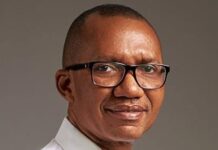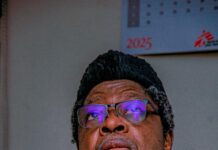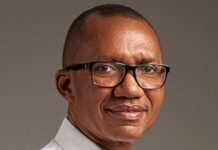The Arbiter
Alhaji Shehu Usman Aliyu Shagari, who died on December 28, 2018 at the age of 93, was one of the most humble, unassuming and experienced leaders Nigeria ever had.
Brought up in the Westminster parliamentary system of government, he was an important figure in the subsequent military government of General Yakubu Gowon and later landed the ultimate job of presiding over the country in an American executive presidential system of government.
READ ALSO: Who was Shehu Shagari?
Born on February 25, 1925, he came from a family destined to rule as his great-grandfather founded the Shagari village from which the family took its name.
A trained teacher, Shehu Shagari, as the norm was then under the yoke of colonialism, started political activism in 1946 – a tender age by today’s standard – with the formation of the Youth Social Circle. In 1948, the group, which he co-founded with Malam Gambo Abuja, was merged with other political groups to form the Northern People’s Congress (NPC).
From being the secretary of the NPC in Sokoto, he got elected into the parliament to represent his constituency of Sokoto Southwest. He was appointed Parliamentary Secretary to the Prime Minister, Sir Abubakar Tafawa Balewa, and in 1959, at the age of 24, he was made the Minister of Economic Development and Minister of Internal Affairs, later becoming the Minister of Works and Survey in 1963.
After the military intervention of 1966, Shagari returned home to serve in the Sokoto Native Authority as Secretary to the Sokoto Province Education Development Fund, and between 1968 and 1969, he was appointed as Commissioner for Establishment in the North Western State.
In 1970, the then head of state, General Yakubu Gowon, made him the Federal Commissioner for Economic Development, Rehabilitation and Reconstruction to replace Malam Yahaya Gusau who had just retired from the office. A year later when Chief Obafemi Awolowo resigned from the cabinet, he was moved to the Ministry of Finance to replace him.
To Alhaji Shehu Shagari, no office was small for him as long as it afforded him the opportunity to serve humanity. Those who knew him were not surprised when in 1976, during the first non-party local government elections, he came out to contest for the position of councillor in Yabo Local Government, which he won. He also served as the chairman of the Sokoto Urban Development Authority (SUDA) which efficiently kept Sokoto clean by clearing refuse and building drainages. SUDA, under him, also contracted Julius Berger to build a new Central Market for Sokoto, to the admiration of the local populace, after the old one got burnt twice.
If no office was too small for Shehu Shagari to serve, then no office was also too big as to intimidate him from seeking it as long as it would afford him the opportunity to serve humanity.
With the lifting of the ban on politics in 1978, Shagari, fresh from serving in the Constituent Assembly – where he was elected to represent Yabo Local Government – he had his eyes on becoming a senator of the Federal Republic of Nigeria, perhaps based on the fact that he was once elected into the parliament or perhaps out of humility.
Whatever his reason for wanting to be a senator, he was convinced by notable Northern elders, among whom was Alhaji Aliyu Makaman Bida, to go for the highest office – the Presidency.
The long and short of it is that he won the primaries of the National Party of Nigeria (NPN), defeating his co-aspirants, among whom were Yusuf Maitama Sule and Malam Adamu Ciroma who stepped down for him rather than go for a run-off election.
He went on to emerge winner in a field of political gladiators of the First Republic – Chiefs Nnamdi Azikiwe and Obafemi Awolowo, Alhaji Waziri Ibrahim and Malam Aminu Kano.
With his long cap and flowing aesthetically embroidered babbar riga and gentle mien, Shagari brought colour to the office he occupied but, above all, he was a true democrat and observer of the rule of law.
A case in point was the political scandal involving Alhaji Shugaba Abdurrahman Darman, the majority leader of the then Borno State House of Assembly who belonged to Waziri Ibrahim’s Great Nigeria Peoples Party (GNPP).
On January 24, 1980, Immigration officers arrested and deported Shugaba Darman to Chad based on a deportation order signed by Alhaji Bello Maitama, minister of Internal Affairs. Shugaba Darman was a thorn in the flesh of the party ruling at the centre to which Maitama Bello belonged.
Being a politically motivated case, the NPN-led federal government brought an old Chadian woman to the court in a case instituted against it by the GNPP government. She cried profusely that Darman was her long lost son and that she wanted him back.
Darman denied knowing her, claiming that his mother, though blind, resided in Maiduguri and was well known. The GNPP legal team led by Chief D. O. A. Oguntoye ushered in their witness – the old, blind, well known Maiduguri-based Kanuri woman – who on just touching Darman shouted in court that he was her son.
The long and short of it is that the Federal Government lost the case at the Maiduguri High Court, lost its appeal in Kaduna and finally lost at the Supreme Court which was then in Lagos.
One thing of note is that the Shehu Shagari federal government abided by all the court judgements from the state high court to the appellate court in Kaduna, culminating in the Supreme Court’s judgment. It did not refuse to respect any of the lower courts because it had appealed its judgment or intended to do so – as is commonplace these days. Rule of law was the government’s mantra.
He was also a suave and urbane president when tackling his political adversaries, especially among the “progressive” governors of the GNPP, Awolowo’s Unity Party of Nigeria (UPN), Azikiwe’s Nigeria Peoples Party (NPP) and the breakaway Peoples Redemption Party (PRP).
In 1980, Shagari started a nation-wide tour starting with the then Bendel State. Two days before the president’s arrival, the UPN governor, Ambrose Alli, banned all political rallies and processions in the state with the intention of stopping the NPN from mobilizing its followers so as to make a political statement, having come second in the state in the just concluded general elections.
Thus the dancing troupes mobilized by the party to welcome the president were stopped by the police from entering the Benin airport at the gate.
However, when the president’s plane landed, the then Minister of Police Affairs, Professor Emmanuel Sunday Osamor, who was also from Bendel, whispered into the ears of the state police commissioner who ordered his men to open the gates for the troupes.
Shagari, in his memorable reply to the governor’s complaint at a state dinner later that night that the minister had overruled an order he issued as chief security officer of the state, said, “My brother Ambrose Alli, medical professor in politics, leave politics to politicians” and exhorted that he and the governor should concentrate on state duties.
Shagari was not corrupt. He never used his position to help himself to the public till. In fact, the federal government had to build him a house after he left office. However, many of those around him were accused of all manner of corrupt practices. He was seen as weak because he failed to take actions against them. But overall, he was a good leader and a gentleman who meant well for Nigeria. May his soul rest in peace.
Follow the Neptune Prime channel on WhatsApp:
Do you have breaking news, interview request, opinion, suggestion, or want your event covered? Email us at neptuneprime2233@gmail.com





